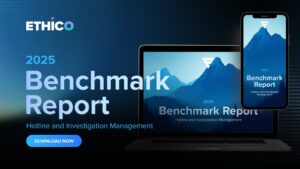Building a Foundation of Integrity: Early Actions for a Strong Company Culture 🌅✍️


Full Episode Available
WATCH ON-DEMANDIn the battle for ethical culture, the most critical moments happen on an employee’s first day on the job. This webinar explored the critical importance of establishing ethical foundations early in the employee lifecycle. Discussions centered on integrating values and compliance messaging throughout the hiring and onboarding process, creating strong partnerships between compliance and HR teams, and developing strategies to cultivate ethical refugees through intentional culture building. The presenters shared practical tools, tactics, and approaches for ethics and compliance professionals to proactively shape organizational culture from the moment potential candidates first interact with the company.
This episode of The Ethicsverse examined the transformative potential of early ethics intervention in the organizational lifecycle, emphasizing how establishing integrity foundations during recruitment and onboarding processes significantly impacts company culture and performance. The presenters explored empirical connections between ethical culture and measurable business outcomes, including employee engagement, productivity, and enterprise value. Through sharing practical implementation strategies, case studies from international contexts, and behavioral science insights, the discussion provided a framework for compliance professionals to collaboratively integrate ethics messaging across multiple touchpoints in the hiring process. The session offered evidence-based approaches for overcoming cross-functional resistance, optimizing employee assessment methodologies, and creating sustainable cultural expectations that align with organizational values, ultimately demonstrating how early ethical action creates lasting behavioral patterns that drive sustainable organizational success.
- Evie Wentink, Principal, Ethical Edge Experts
- Sevinj Novruzova, Head of Ethics and Compliance, Azercell Telecom LLC
- Nick Gallo, Chief Servant & Co-CEO, Ethico
The Business Case for Culture
- Establishing a strong ethical culture directly correlates with concrete business benefits, with data showing ethical companies experience increased sales growth and higher employee engagement.
- Millennial employees now prioritize culture fit above all other employment factors, representing a significant shift in workforce values that ethics professionals can leverage.
- This alignment between workforce priorities and compliance objectives creates an unprecedented opportunity to drive meaningful cultural change that benefits both employees and organizational performance.
Early Intervention is Critical
- Setting clear ethical expectations at the beginning of the employment relationship is vastly more effective than attempting to instill values later in an employee’s tenure.
- The difference between employees who receive ethics messaging from day one versus those who encounter it months into their role is remarkably pronounced in terms of ethical awareness and behavior.
- Every interaction during the hiring process represents a critical opportunity to shape expectations and demonstrate organizational commitment to integrity.
Multiple Touchpoints Matter
- Ethics and compliance messaging should be integrated across numerous touchpoints throughout the hiring process, including job postings, application acknowledgments, interview questions, offer letters, and formal onboarding.
- Each communication channel represents a chance to reinforce organizational values and set expectations for ethical behavior before an employee’s first day.
- Consistent messaging across these touchpoints creates a powerful impression that ethics is not merely a program but a fundamental aspect of how the organization operates.
Collaboration with HR is Essential
- Building relationships with HR professionals and recruiting teams is crucial for successfully integrating ethics into the hiring process, yet resistance often stems from information overload or lack of understanding about compliance priorities.
- Effective partnerships require compliance professionals to approach HR as allies rather than critics, offering ready-made solutions that add value without adding burden.
- The most successful integration happens when compliance teams adopt a service-oriented approach, providing HR with turnkey resources that enhance rather than complicate the hiring process.
Manager Activation Drives Culture
- Front-line managers have an outsized influence on culture since employees typically quit managers rather than companies, making their ethical leadership capabilities crucial for retention and engagement.
- Effective manager activation requires moving beyond aspirational statements in the code of conduct to provide specific guidance, tools, and expectations for having ethics conversations with their teams.
- When managers regularly discuss ethical topics with their teams, they build comfort with these conversations, transforming abstract values into concrete behavioral norms.
Generation Targeting Matters
- Today’s workforce, particularly younger generations, is increasingly concerned with working for organizations whose values align with their own personal ethics, creating a population of “ethical refugees” seeking better workplace cultures.
- Companies that explicitly emphasize their ethical culture in recruitment materials appeal directly to these candidates who may have left previous employers due to ethical misalignment.
- This dynamic creates a competitive advantage in talent acquisition for organizations that authentically demonstrate their commitment to integrity.
Onboarding Timing is Critical
- Many organizations delay compliance training for weeks or months after an employee starts, missing the critical window when new hires are most receptive to understanding organizational expectations.
- Effective onboarding programs introduce ethics and compliance concepts within the first week of employment, when employees are actively forming impressions about company culture.
- This early timing establishes ethics as a foundational element of the organization rather than an afterthought or regulatory burden.
External Assessment Considerations
- Organizations increasingly incorporate behavioral assessments and integrity testing during hiring processes, though implementing these tools requires careful consideration of their alignment with company values and culture.
- These assessments must balance objective data with human oversight to ensure they identify candidates who will support the ethical culture while avoiding unnecessary exclusion.
- Proper implementation requires thoughtful evaluation of assessment validity, careful interpretation of results, and clear parameters for how assessment data influences hiring decisions.
Continuous Reinforcement Required
- Establishing an ethical culture is not a one-time event but rather requires ongoing reinforcement through regular communication, leadership modeling, and consistent accountability.
- Cultural initiatives that succeed short-term often falter without mechanisms to sustain momentum through personnel changes, competing priorities, and organizational evolution.
- Like maintaining a bonfire that needs constant attention, cultural development requires persistent, intentional effort to keep ethical considerations at the forefront of organizational consciousness.
Global Implementation Considerations
- Ethics and compliance strategies must be adapted to local contexts while maintaining core principles, as demonstrated by the presenters’ experiences implementing programs in different countries.
- Cultural norms, regulatory frameworks, and business practices vary significantly across regions, requiring thoughtful customization of ethics messaging and delivery methods.
- Building a global ethical culture requires balancing universal principles with localized implementation strategies that respect cultural differences while upholding organizational values.
Closing Summary
The cultivation of ethical culture begins the moment a candidate first encounters your organization and requires persistent attention throughout the employee lifecycle. By strategically integrating ethics and compliance messaging into each phase of the hiring and onboarding process, organizations can establish powerful foundations for integrity that yield measurable business benefits. As ethics and compliance professionals, our challenge is to move beyond check-box approaches to build meaningful partnerships across functions, engage managers as ethical leaders, and create systems that consistently reinforce values-based behavior from day one.






































